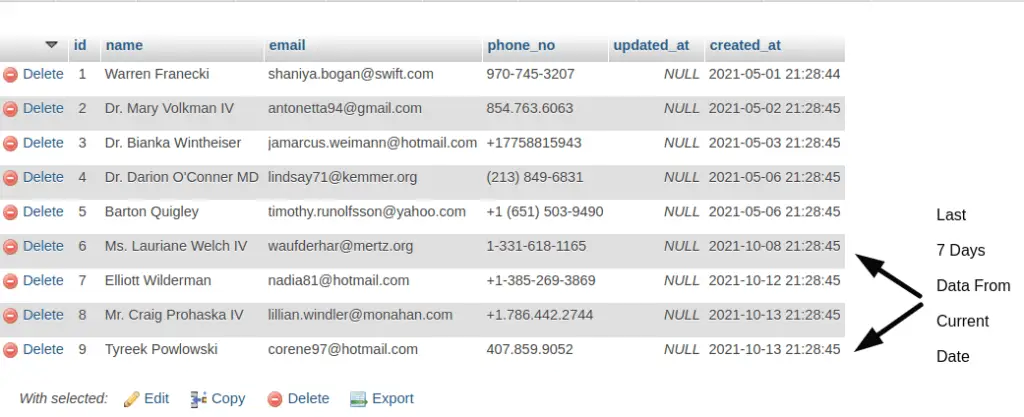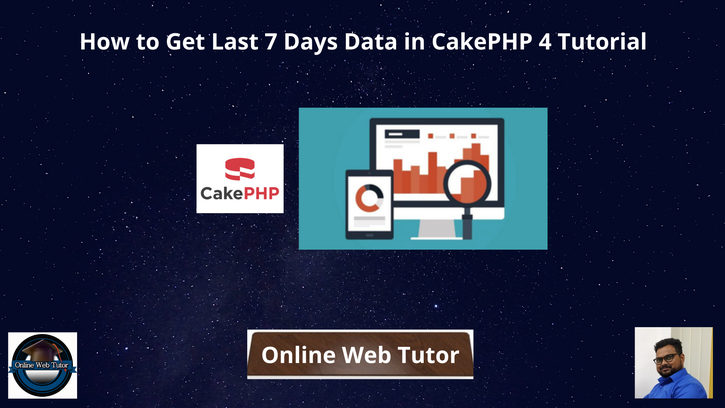Inside this article we will see how to get last 7 days data in cakephp 4. Article has very classified information about last 7 days data selection from database in cakephp 4.
Selecting data rows from database in cakephp 4, we have several options available as – Using Models, Using Query Builder, Using raw queries.
Last 7 days data selection is very helpful when we are creating data reports of application.
This article gives you a detailed on cakephp 4 to get Last 7 days data. Here, Creating a basic example of cakephp from which we will select data in last 7 days.
Learn More –
- CakePHP 4 How To Get Query String Parameters Tutorial
- How to Get Last 30 Days Data in CakePHP 4 Tutorial
- CakePHP 4 How To Redirect To Other Routes Tutorial
- CakePHP 4 How To Rename Table Using Migration
Let’s get started.
CakePHP 4 Installation
To create a CakePHP project, run this command into your shell or terminal. Make sure composer should be installed in your system.
$ composer create-project --prefer-dist cakephp/app:~4.0 mycakephp
Above command will creates a project with the name called mycakephp.
Create Database
To create a database, either we can create via Manual tool of PhpMyadmin or by means of a mysql command.
CREATE DATABASE mydatabase;Successfully, we have created a database.
Database Connection
Open app_local.php file from /config folder. Search for Datasources. Go to default array of it.
You can add your connection details here to connect with your database. It will be like this –
//...
'Datasources' => [
'default' => [
'host' => 'localhost',
/*
* CakePHP will use the default DB port based on the driver selected
* MySQL on MAMP uses port 8889, MAMP users will want to uncomment
* the following line and set the port accordingly
*/
//'port' => 'non_standard_port_number',
'username' => 'root',
'password' => 'sample@123',
'database' => 'mydatabase',
/*
* If not using the default 'public' schema with the PostgreSQL driver
* set it here.
*/
//'schema' => 'myapp',
/*
* You can use a DSN string to set the entire configuration
*/
'url' => env('DATABASE_URL', null),
],
//...
//...
You can pass host, username, password and database.
Successfully, you are now connected with the database.
Sample Database Data Rows
Here, we have taken a sample database to understand this example.
Let’s say we have a users table inside it which contains users data. Please look into this screenshot to get clear vision about table.

Next,
We want to get all data from this table of last 7 days in CakePHP 4.
Create Query for Data
Open any controller from your application.
Let’s add last 7 days concept into it to get data.
<?php
declare(strict_types=1);
namespace App\Controller;
use Cake\Datasource\ConnectionManager;
class SiteController extends AppController
{
private $db;
public function initialize(): void
{
parent::initialize();
$this->db = ConnectionManager::get("default");
$this->autoRender = false;
}
public function getUsers()
{
$results = $this->db
->newQuery()
->select('name, email, phone_no')
->from('users')
->where('created_at >= DATE(NOW()) - INTERVAL 7 DAY')
->execute()
->fetchAll('assoc');
print_r($results);
}
}
Query Concept
Make use of MySQL Last 7 Days Data Selection Concept.
Generated Query
SELECT `name`, `email`, `phone_no` FROM `users` WHERE `created_at` >= DATE(NOW()) - INTERVAL 7 DAYWhen we run this code, we will get result of last 7 days.
We hope this article helped you to How to Get Last 7 Days Data in CakePHP 4 Tutorial in a very detailed way.
If you liked this article, then please subscribe to our YouTube Channel for PHP & it’s framework, WordPress, Node Js video tutorials. You can also find us on Twitter and Facebook.
Read more